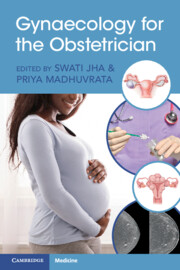Book contents
- Gynaecology for the Obstetrician
- Gynaecology for the Obstetrician
- Copyright page
- Dedication
- Contents
- Contributors
- Foreword
- Preface
- Chapter 1 Ovarian Cysts in Pregnancy
- Chapter 2 Fibroids in Pregnancy
- Chapter 3 Cervical Abnormalities in Pregnancy
- Chapter 4 Vulval Disorders in Pregnancy
- Chapter 5 Congenital Uterine Malformations and Vaginal Anomalies
- Chapter 6 Vaginal Prolapse and Previous Prolapse Surgery
- Chapter 7 Urinary Tract Problems in Pregnancy
- Chapter 8 Previous Third and Fourth Degree Tears
- Chapter 9 Management of Post-Partum Retained Placental Remnants
- Chapter 10 Gestational Trophoblastic Disease (GTD)
- Chapter 11 Female Genital Mutilation
- Chapter 12 Ovarian and Cervical Malignancy in Pregnancy
- Chapter 13 Post-Partum Contraception
- Chapter 14 Pregnancy Associated Breast Cancer
- Index
- References
Chapter 4 - Vulval Disorders in Pregnancy
Published online by Cambridge University Press: 14 July 2023
- Gynaecology for the Obstetrician
- Gynaecology for the Obstetrician
- Copyright page
- Dedication
- Contents
- Contributors
- Foreword
- Preface
- Chapter 1 Ovarian Cysts in Pregnancy
- Chapter 2 Fibroids in Pregnancy
- Chapter 3 Cervical Abnormalities in Pregnancy
- Chapter 4 Vulval Disorders in Pregnancy
- Chapter 5 Congenital Uterine Malformations and Vaginal Anomalies
- Chapter 6 Vaginal Prolapse and Previous Prolapse Surgery
- Chapter 7 Urinary Tract Problems in Pregnancy
- Chapter 8 Previous Third and Fourth Degree Tears
- Chapter 9 Management of Post-Partum Retained Placental Remnants
- Chapter 10 Gestational Trophoblastic Disease (GTD)
- Chapter 11 Female Genital Mutilation
- Chapter 12 Ovarian and Cervical Malignancy in Pregnancy
- Chapter 13 Post-Partum Contraception
- Chapter 14 Pregnancy Associated Breast Cancer
- Index
- References
Summary
Vulval disorders are not uncommon in obstetric practice. This chapter aims to enhance clinical skills in patient assessment, vulval examination and treatment of common benign vulval skin disease and infections. Basic treatments often benefit the patient (e.g. use of emollients and topical steroids). Some patients have complex disease and can present with more than one condition, so careful assessment and individualised management is essential. Understanding of when to refer onwards to a gynaecologist and even a vulval specialist service is important to optimise clinical outcomes.
Keywords
- Type
- Chapter
- Information
- Gynaecology for the Obstetrician , pp. 31 - 39Publisher: Cambridge University PressPrint publication year: 2023



